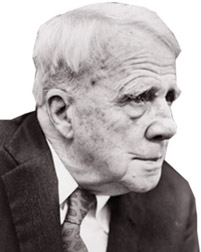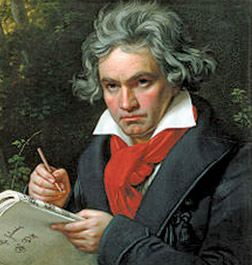|
Poetic introductions:
‘It begins in delight and ends in wisdom’
 A communication from an occasional reader of this column suggested
this subject. Brian Rutnam, long removed to Australia but still renowned
for his electrifying portrayal of characters from Ibsen, Tchekov and
Moliere on the local stage in the sixties and seventies, recollected the
fascination that the Wyatt poem we featured last week had for him when
he came across it as a student. I remember being similarly affected at
the time, and believe the secret lies in the electrifying effect of its
opening lines: “They flee from me that sometime did me seek With naked
foot, stalking in my chamber.” After such an introduction, one just had
to go on reading. A communication from an occasional reader of this column suggested
this subject. Brian Rutnam, long removed to Australia but still renowned
for his electrifying portrayal of characters from Ibsen, Tchekov and
Moliere on the local stage in the sixties and seventies, recollected the
fascination that the Wyatt poem we featured last week had for him when
he came across it as a student. I remember being similarly affected at
the time, and believe the secret lies in the electrifying effect of its
opening lines: “They flee from me that sometime did me seek With naked
foot, stalking in my chamber.” After such an introduction, one just had
to go on reading.
Like any introduction, poetic introductions have to be arresting if
the audience is to be disposed to pay attention to the rest of one’s
discourse. An effective introduction, even in a utilitarian composition
like a speech or an essay, has to capture interest, identify the subject
and indicate its importance for the audience.
In poetry, this is all the more important because, as with all
creative writing, what has to be engaged is not only the reader’s mind,
but also his heart.
The poet’s opening words are the evidence of the outbreak of his
inspiration, the beginning of “the spontaneous overflow of powerful
feelings” that, according to Wordsworth, follows upon the tranquil
recollection of an emotional experience.
 |
|
Robert
Frost |
In poetry, genuine inspiration is inseparable from its expression in
words. The poet is very much like the composer of music, the start of
whose inspiration manifests itself in a certain arrangement of notes
that forms an opening motif. Thus, in Beethoven’s 5th Symphony,
described by Forster as “the most sublime noise that has ever penetrated
into the ear of man,” we have the opening figure of three short notes at
the same pitch followed by a long one a major third below, popularly
claimed to represent Fate knocking on your door. This is, in fact, the
most famous of all musical openings, and it is easy to see how
Beethoven’s initial inspiration finds immediate expression in these
opening notes, which determine the drift of the entire first movement
and influence all the other movements as well.
It is the same for the poet. Under the pressure of his inspiration
the right opening choice and combination of words suggests itself. This
is because as, Leavis says, “ his capacity for experiencing and his
power of communicating are indistinguishable….his power of making words
express what he feels is indistinguishable from his awareness of what he
feels….He is a poet because his interest in his experience is not
separable from his interest in words.”
This helps us to understand why the introduction must necessarily
come first in poetic composition as in musical. In utilitarian or
non-creative discourse, it is the other way round.
You think of and work out the introduction after the body of the
speech or essay has been settled. This is because inspiration does not
come into the picture here. I was apprised of this when, as a student, I
tried to blame the poor quality of a tutorial on Wordsworth on my lack
of inspiration at the time of its composition. I was sharply advised
that that was not how tutorials were meant to be written.
Thus, good openings usually make for good complete poems. Consider
these examples: “Th’ expense of spirit in a waste of shame Is lust in
action and, till action, lust,” (Shakespeare); “The world is too much
with us; late and soon, Getting and spending, we lay waste our powers;”
(Wordsworth); “Season of mists and mellow fruitfulness: Close
bosom-friend of the maturing sun. (Keats); “Thou art, indeed, just,
Lord, if I contend With thee; but, sir, so what I plead is just.”
(Hopkins); “There was never a sound beside the wood but one, And that
was my long scythe whispering to the ground.” Frost)
These are the perfect starts to near-perfect poems, all of them,
incidentally, sonnets. The reader’s feelings are engaged from the start
and he has to go on reading to satisfy not only his curiosity, but the
emotional need that has been evoked in him. Nor do these poems
disappoint, for the poets maintain the momentum and the intensity of
their openings down to the last line, providing us with an enlightening
emotional experience. “This”, as Frost says,” Is the figure a poem
makes.
It begins in delight and ends in wisdom,” That initial delight of the
outburst of inspiration is what Hopkins refers to, and captures, in the
opening lines of his last sonnet: “The fine delight that fathers
thought: the strong Spur, live and lancing like the blowpipe flame.”
This delight of a poem’s beginning not only determines the words but
their arrangement, as in the case of musical notes. This could be
illustrated by looking again at Shakespeare’s sonnet opening quoted
above. What Shakespeare had s done here, under the influence of his
inspiration, is to put the predicate before the subject.
 |
|
Beethoven |
In fact, I used to misunderstand the meaning of these lines because
of their syntax, assuming Shakespeare to mean that an unrestrained
exhibition of passion is as bad as lascivious conduct. What he really
means is that enacted lust is a shameful wastage of one’s vital force.
But if he had put it in that logical order, eg. “Lust in action is a
shameful waste Of spirit,” the opening would have fallen flat, nor would
Shakespeare have been able to continue the sonnet effectively.
To get back to Wyatt’s poem, it is the way the introduction is
expressed that enables it to work its magic on us. The dramatic
juxtaposition of the two contrasting motions of fleeing and seeking is
qualified by the assonance of the two verbs, emphasizing the fact that
both actions are performed by the very same persons.
The startling adjective ‘naked’ conveys both the self-surrender and
the daring with which he was sought, while ‘stalking’, along with the
sudden change of rhythm it introduces, suggests the predatory nature as
well as the importunacy of his erstwhile seekers. Wyatt carries his
injured sense of betrayal right through to the end, sharpening it with a
fond recollection of a time of tender intimacy, and concluding with a
finely ironical inquiry as to his former mistress’s future prospects.
This does not mean that great beginnings automatically result in
great poems. The poet has to maintain his initial inspiration down to
the end if his poem is to succeed as a whole. If the inspiration dries
up midway and the poet continues to compose, he will produce what
Hopkins calls Parnassian, namely verse that is competent enough and
characteristic of his personal style but lacking “the roll, the rise,
the carol, the creation” of the truly inspired work. Even the great
Shakespeare is guilty of this in some of his sonnets.
Consider the one with the arresting opening, “When to the sessions of
sweet silent thought I summon up remembrance of things past.”
Shakespeare fails to live up to the promise of this opening, and the
thought and the expression become progressively maudlin. He would have
done better to stop writing, meditate further on his experience and
await the further onset of inspiration.
What can be asserted, though, is that a weak beginning invariably
means a weak poem. The poet, failing to activate his poetic imagination
and gain that initial burst of inspiration, has tried to free-wheel on
his skill and experience, and on his unheartfelt ideas, and has come a
cropper. Such poems neither begin in delight nor end in wisdom. Read
through any index of first lines and you are likely to find this to be
the case.
|



